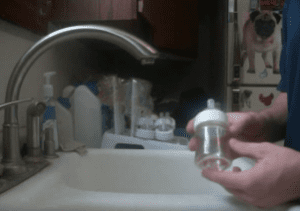
Baby Bottles Contain Dangerous Levels of BPA. In February we wrote that despite U.S. Food and Drug and Administration’s (FDA) constant assertions that bisphenol A (BPA) exposure levels do not pose an immediate health risk to the general population, including infants and young children, Chicago disagreed and proposed a ban on the controversial, estrogenic toxin. […]

Baby Bottles Contain Dangerous Levels of BPA. In February we wrote that despite U.S. Food and Drug and Administration’s (FDA) constant assertions that bisphenol A (BPA) exposure levels do not pose an immediate health risk to the general population, including infants and young children, Chicago disagreed and proposed a ban on the controversial, estrogenic toxin. This week, the ban became a reality with Chicago being the first city in the United States to ban BPA-containing baby bottles and sippy cups, the Associated Press (AP) reported.
Last year, Canada was the first country to announce plans to ban the toxin and, earlier this year, Suffolk County, in New York’s Long Island, was the first in this country with Minnesota—the first state—passing its ban this month. The AP said a federal ban has been proposed and is pending in Congress to ban BPA in food containers; 24 states also have bills in the works to restrict the toxin.
Chicago’s BPA ban was approved by Chicago’s City Council with an overwhelming majority vote of 48-0, and will take effect January 31, 2010, said the AP, citing Mayor Richard M. Daley, who also plans on signing the ban. “This is an important step in a landmark consumer protection initiative. This legislation will protect Chicago’s children and send a clear message to other jurisdictions considering similar legislation,” said Alderman Manny Flores, co-sponsor of the proposal, quoted the AP.
The Chicago Tribune explained that, once in effect, any empty food or drink container containing BPA and meant for use by children less than three years of age will be banned. Chicago Alderman Edward Burke, one of the ban’s sponsors said, “We should err on the side of caution and not needlessly expose people to the harmful effects, especially children,” according to the AP.
Burke and Flores pushed for the ban, but only after acquiescing from a stronger version meant to ban almost all children’s products made with BPA, said the Chicago Tribune. In opposition to the ban, the chemical industry hired former Alderman Terry Gabinski as a lobbyist against it.
Industry group, the American Chemistry Council, issued a statement arguing that Chicago’s ban is not necessary, “The new Chicago law is contrary to the global consensus on the safety of BPA and ignores the expert evaluations of scientists and government bodies from around the world,” it said, the AP quoted.
Despite industry’s arguments that the toxic chemical is safe at current dosages, BPA, a ubiquitous chemical estrogenic mimicker used to harden plastics, has been linked to a variety of diseases including an increased risk of diseases or disorders of the brain, reproductive, and immune systems. Recent studies link BPA exposure to problems with liver function testing, an increased risk of diabetes and heart disease, and interruptions in chemotherapy treatment; BPA exposure has long been linked to hormonal disturbances.
BPA was also associated with serious health problems based on 130 studies conducted in the past 10 years, the Washington Post reported late last year, and newer research found BPA to have negative effects at “very low doses,” lower than the FDA’s safety standards currently in place. Most recently, studies revealed that BPA seems to stay in the body longer than previously believed. BPA is so ubiquitous, it can be found virtually everywhere and is present in detectable levels in just about every human body. The highest levels are seen, noted the Chicago Tribune, in the youngest Americans.
Meanwhile, the FDA continues to maintain that BPA is safe at current levels despite that it was relying solely on two industry-funded studies for its information, something for which the agency has long been criticized.
The personal injury attorneys at Parker Waichman LLP offer free, no-obligation case evaluations. For more information, fill out our online contact form or call 1-800-YOURLAWYER (1-800-968-7529).


